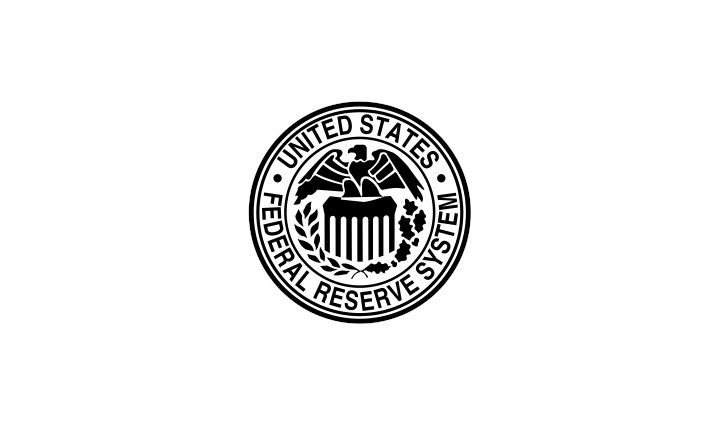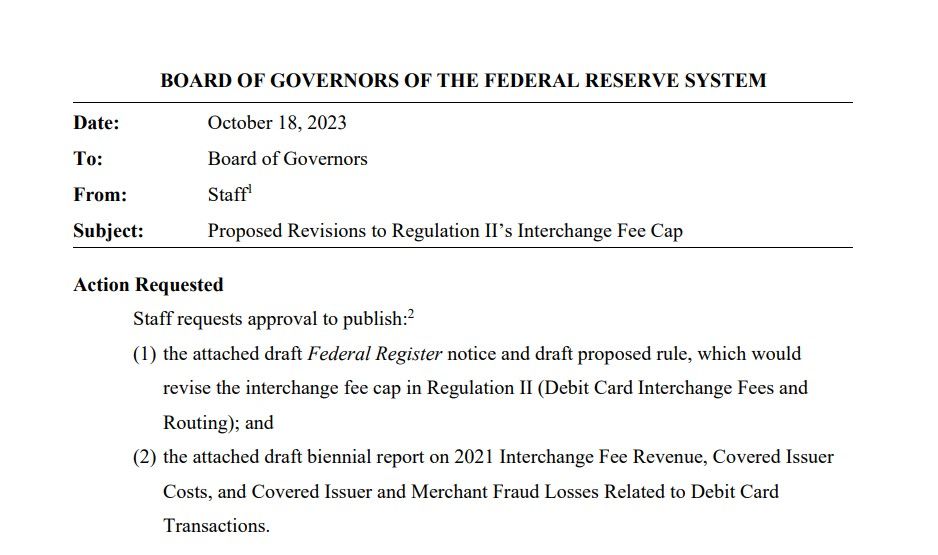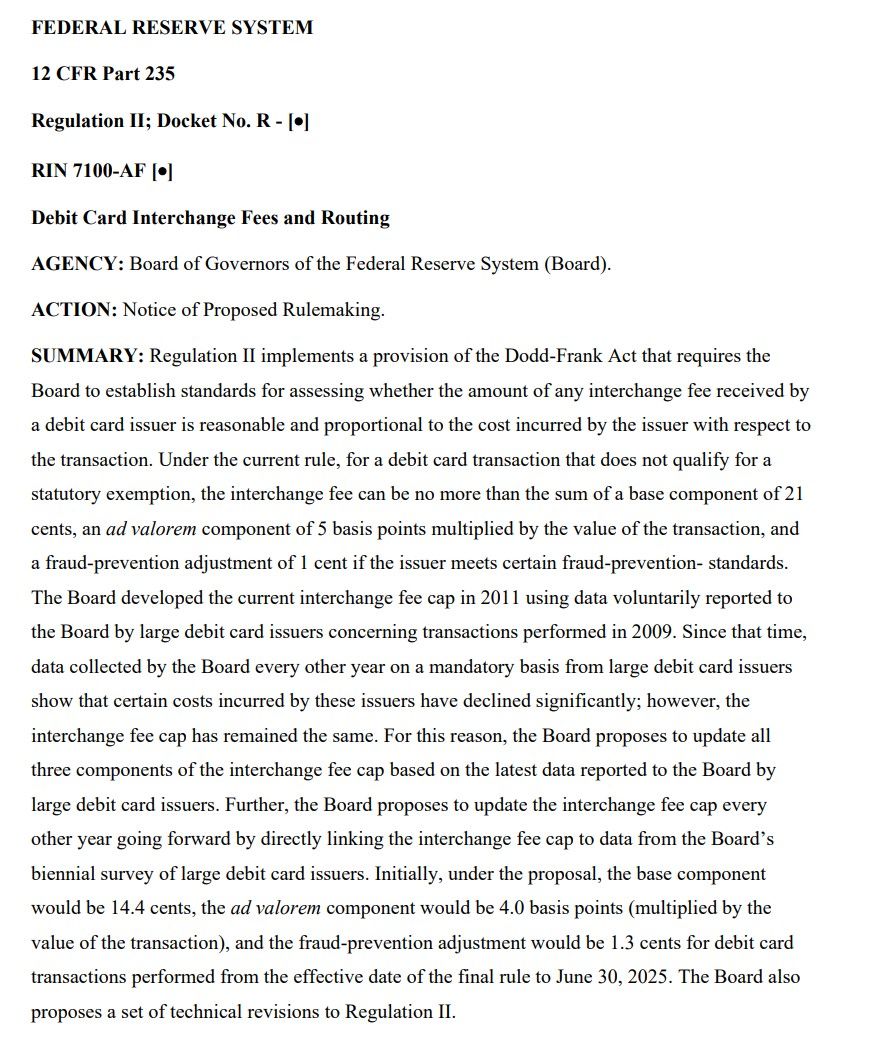The Fed requests comment on a proposal to lower the maximum interchange fee. For example, the cap on an average-sized $50 debit card transaction would decline from 24.5 cents under the current rule to 17.7 cents under the proposal.


Summary of Proposed Rule:
Congress has required the Board to establish standards for assessing whether the amount of any interchange fee received by a debit card issuer is reasonable and proportional to the cost incurred by the issuer with respect to the debit card transaction. The statutory provision – known as the Durbin Amendment – also authorizes the Board to allow for an adjustment to such interchange fee in an amount that is reasonably necessary to make allowance for costs incurred by the debit card issuer in preventing fraud in relation to debit card transactions involving that issuer.
The Board implemented these and other provisions of the Durbin Amendment in 2011 and 2012 when the Board adopted Regulation II (Debit Card Interchange Fees and Routing). Under the current rule, each interchange fee received by a debit card issuer for a debit card transaction can be no more than the sum of (i) 21 cents (the “base component”), (ii) 5 basis points multiplied by the value of the transaction (the “ad valorem component”), and (iii) for a debit card issuer that meets certain fraud-prevention standards, a “fraud-prevention adjustment” of 1 cent per transaction. Together, these three components comprise the “interchange fee cap.” The interchange fee cap applies to debit card transactions that do not qualify for a statutory exemption, the most significant of which is the exemption for debit card issuers with consolidated assets of less than $10 billion. Issuers with consolidated assets of at least $10 billion are referred to as “covered issuers” and are generally subject to the interchange fee cap.
The Board developed the current interchange fee cap using data reported to the Board by covered issuers on a voluntary survey that the Board conducted in 2010 during the original Regulation II rulemaking. As such, the current base component, ad valorem component, and fraud-prevention adjustment are based on the costs incurred by covered issuers in connection with debit card transactions performed in 2009.
Since that time, the Board has collected data from covered issuers on a mandatory basis every other year, as required by the Durbin Amendment. These data show that the costs incurred by covered issuers in connection with debit card transactions have changed significantly over time. In particular, the transaction-processing costs on which the Board based the base component have nearly halved, the issuer fraud losses on which the Board based the ad valorem component have fallen, and the fraud-prevention costs on which the Board based the fraud prevention adjustment have risen. As a result, staff believes that the current interchange fee cap may no longer be effective for assessing whether, for a debit card transaction subject to the cap, the amount of any interchange fee received by a debit card issuer is reasonable and proportional to the cost incurred by the issuer with respect to the transaction, as required by the Durbin Amendment.
The proposed revisions would update all three components of the interchange fee cap based on the latest data reported to the Board by covered issuers regarding debit card transactions performed in 2021. Under the proposal, the base component would decrease from 21.0 to 14.4 cents, the ad valorem component would decrease from 5.0 basis points (multiplied by the value of the transaction) to 4.0 basis points (multiplied by the value of the transaction), and the fraud-prevention adjustment would increase from 1.0 cents to 1.3 cents.3 The proposed base component was determined using a new methodology that is informed by the cumulative data that have been reported to the Board every other year since the original rulemaking. This methodology targets full cost recovery over time for a significant majority of transactions across covered issuers through a formula that relates the base component to a key metric of covered issuer costs. By contrast, the proposed ad valorem component and proposed fraud-prevention adjustment were determined using generally the same methodologies used in the original rulemaking.
In addition to updating the interchange fee cap for the first time since the original rulemaking, the proposed revisions would codify in Regulation II an approach for updating the three components of the interchange fee cap every other year going forward based on the latest data reported to the Board by covered issuers.4 By directly linking the interchange fee cap to data from the Board’s biennial survey of covered issuers, this approach should ensure going forward that, to the extent practicable, any interchange fee subject to the cap will be reasonable and proportional to the cost incurred by the issuer with respect to the transaction, as required by the Durbin Amendment. These future updates to the interchange fee cap would be published without inviting public comment and would be published by March 31 of odd-numbered years, with the new amounts taking effect on July 1 and remaining in effect for two years.
Finally, the proposed rule would make various technical changes to Regulation II.
Wut Mean?:
- Congress mandated the Fed set standards to assess if interchange fees for debit card issuers are reasonable and aligned with transaction costs.
- This provision is called the Durbin Amendment.
- The Durbin Amendment allows for fee adjustments to account for fraud prevention costs.
- In 2011 and 2012, the Board implemented the Durbin Amendment through Regulation II, outlining the structure for interchange fees.
Interchange fees can't exceed:
- 21 cents (base component)
- 5 basis points of transaction value (ad valorem component)
- An additional 1 cent for issuers meeting fraud-prevention standards (fraud-prevention adjustment).
- These components form the "interchange fee cap."
- The cap doesn't apply to debit card issuers with assets under $10 billion.
- Issuers with assets over $10 billion are "covered issuers" and generally fall under the fee cap.
- The current fee structure was based on 2009 transaction data from a voluntary survey of covered issuers.
- The Board has since collected mandatory data biennially, revealing significant changes in transaction costs.
- Transaction-processing costs have decreased, issuer fraud losses have dropped, and fraud-prevention costs have risen.
- The current fee cap may not effectively ensure interchange fees are reasonable and proportional to transaction costs.
Proposed revisions:
- Base component drops from 21 cents to 14.4 cents.
- Ad valorem component decreases from 5 basis points to 4 basis points.
- Fraud-prevention adjustment increases from 1 cent to 1.3 cents.
- The proposed base component uses a new calculation method based on accumulated data.
- The proposal also includes a method to update the interchange fee cap biennially, based on latest data.
- This biennial update aims to ensure fees are in line with the Durbin Amendment's requirements.
- Updated fees would be announced by March 31 of odd-numbered years, effective from July 1 for two years.
Federal Register notice: Debit Card Interchange Fees and Routing:

Statement on Proposed Revisions to Regulation II’s Interchange Fee Cap by Governor Michelle W. Bowman:
I would like to begin by recognizing staff for their work in preparing today's proposal and the accompanying presentation for today's open Board meeting. As I noted during yesterday's open board meeting, I am encouraged by the Board's renewed commitment to considering important regulatory matters through open Board meetings. Addressing important policy issues in this open forum promotes public transparency about the important work of the Board.
Today, the Board is considering a proposal to amend the regulatory cap on debit interchange fees. The Dodd-Frank Act mandates that the Federal Reserve establish a cap on debit interchange fees that is reasonable and proportional to the cost incurred by the issuer with respect to debit transactions.
In my view, before engaging in a significant regulatory proposal, it is critical to reflect on the broader context, and understand the potential consequences of the revisions. While the proposal suggests that it could result in benefits to consumers, I am concerned that the costs for consumers—through the form of increased costs for banking products and services—will be real, while the benefits to consumers—such as lower prices at merchants— may not be realized.
Consequences and Costs.
The debit card payments ecosystem is a vitally important part of the overall payment infrastructure in the United States, and as staff has noted according to the most recent industry data collection from 2021, debit cards remain the most popular form of noncash payment. When we are considering proposed changes to the fees that support this important form of payment, we must take into account the broader context: the wide range of business models and sizes for issuers subject to the interchange fee cap; the effect of the rule on bank capital and earnings; the potential benefits and costs to consumers; the cumulative effect of regulatory changes and rules; and other unintended consequences.
While today's rule acknowledges the varied size, business models, and product offerings of banks subject to the interchange fee cap, the fee cap aims to achieve "rough justice" by establishing a single cap that applies to all covered issuers. This fee cap is the product of aggregated data reported by issuers.
Both setting a single cap for all issuers and basing that cap on data reported by a wide range of issuers is regressive in several ways. Larger issuers—those with the highest transaction volumes, greater negotiating power, and the most efficiencies that come from scale—will continue to have a significant competitive advantage under this rule. Even the lower interchange fee may allow them to continue profitably operating their debit card programs.
By contrast, smaller issuers subject to the cap—those with smaller transaction volumes, less negotiating power, and fewer efficiencies in scale—may be at a significant competitive disadvantage. Because retail banking is such a core function for many smaller issuers, this pricing dynamic may not ultimately force smaller issuers to abandon their debit card programs. But it is possible that banks will be forced to either pass costs through to customers or operate their debit card programs as a loss leader, which many banks do today. Under the proposed rule, nearly one-third of bank issuers would not be able to recover even the subset of costs that factor into the interchange fee cap, let alone those debit card program costs that are disregarded in the cap. Because debit card programs are important to the functioning of the payments system, any increase in price or reduction in availability of debit cards could be harmful for bank customers, particularly low-income customers who may not qualify for credit card products or other alternatives.
The proposal also acknowledges that a lower interchange fee cap will result in an ongoing, permanent decrease in gross revenue from interchange fees. This consequence will be felt at banks of all sizes. While the banking system remains strong and resilient, I am concerned that the cumulative effect of regulatory changes—including a lower interchange fee cap, higher capital requirements, new debt-funding requirements, increasing data collection requirements, and many others—could pose ongoing risks to the health of certain financial institutions and the overall U.S. banking system.
While banks charging fees for services has been criticized by some regulators, in many instances these fees support a bank's ability to offer low-cost or no-cost banking products or services to customers. It is difficult to predict the impact of this rule on bank product offerings, but one consequence may be that banks discontinue their lowest-margin products, including options designed to increase financial inclusion and access for low- and moderate-income individuals and families. I sincerely hope that this is not the case, but this is a real and important risk. While the newly revised CRA rules create incentives for banks to offer responsive deposit products, other rules should not impede ongoing progress to improve broader financial product access and availability.
Before finalizing any rule, it is incumbent upon policymakers to understand the intended and unintended consequences of our revisions. This is particularly important when we are talking about vital payment tools like debit cards.
Formula for Periodic Updates
Today's proposal also includes a formula that would periodically adjust the interchange fee cap based on data collected by the Board over time. Once a formulaic approach is adopted, it will be hard to overcome inertia to revisit and reopen that approach, even if there are good reasons to do so. There is merit in the Board periodically reconsidering whether the data we collect as the foundation for the cap is appropriate and accurate. There also is merit in revisiting from time to time the policy decisions embedded in the formulaic approach to setting the interchange fee cap. And, there is merit in responding to changing conditions as the payments system evolves, given new market entrants and the increase and evolution of fraudulent activity in the payments system.
One evolution relates to the recent significant revisions adopted by the Board related to debit card transaction routing rules. We do not yet know the effects of those revisions, and I would have preferred that the Board pause to collect data on evolving conditions before proposing this rule change, and follow a more deliberative approach for future updates to the interchange fee cap.
Scope
While today's rule only applies directly to a subset of issuers, those with more than $10 billion in assets, I am concerned that the impact of the fee cap has and will likely continue to affect a broader range of issuers, including community banks. Virtually all retail banks offer checking accounts and debit cards to their customers, and many of these retail banks are community banks, banks that are intended to be exempt from the interchange fee cap.
These smaller debit card issuers do not exist in a vacuum. Issuers of all sizes use the same payment rails, and smaller issuers inevitably face some degree of pricing pressure, at least indirectly, from the interchange fee cap. And while the interchange fees many smaller issuers have collected since the introduction of the interchange fee cap may have remained largely stable, it is difficult to determine how this compares to the aggregate costs of processing, fraud and fraud prevention, and the many other inputs for running a debit card program. It is not clear that interchange fees have kept up for many smaller issuers, and I am concerned that even if the interchange fee cap does not directly apply, smaller issuers will continue to face ongoing fee pressure in operating debit card programs.
Transition Period
Today's proposal suggests that any final rule would become effective "at least 60 days" after the final rule is published in the Federal Register. I look forward to public comment on whether such a brief transition period is reasonable for issuers to make any changes to systems, products, or terms and conditions that may be necessary to adjust to an amended debit card interchange fee cap. I suspect that this short transition period will put undue burden on banks. Requiring them to make changes under a 60-day timetable could significantly increase their short-term operational risk.
Conclusion
While I look forward to reviewing feedback from the public, for the reasons noted above, I cannot support the proposed revisions to Regulation II's interchange fee cap and plan for periodic updates.
2021 Interchange Fee Revenue Report
Press Release:
The Federal Reserve Board on Wednesday requested comment on a proposal to lower the maximum interchange fee that a large debit card issuer can receive for a debit card transaction. The proposal would also establish a regular process for updating the maximum amount every other year going forward.
By law, the Board is required to establish standards for assessing whether an interchange fee received by a large debit card issuer for processing a transaction is reasonable and proportional to certain issuer costs. The Board first implemented this statutory requirement in 2011, setting an interchange fee cap for debit card issuers with $10 billion or more in assets. The proposal would adjust the interchange fee cap to reflect changes in issuer costs since the rule first took effect. For example, the cap on an average-sized $50 debit card transaction would decline from 24.5 cents under the current rule to 17.7 cents under the proposal. In addition, the proposal would adopt an approach for future adjustments to the interchange fee cap, which would occur every other year based on issuer cost data gathered by the Board from large debit card issuers.
The Board today also approved the release of the latest biennial report detailing data collected from large debit card issuers on interchange fees, issuer costs, and fraud related to debit card transactions in 2021.
The comment period will close 90 days after the proposal is published in the Federal Register.
Open for Comment:
Comments must be submitted by 90 DAYS AFTER PUBLICATION IN THE FEDERAL REGISTER.
Methods to submit comments:
- Agency Web Site: Visit http://www.federalreserve.gov and follow instructions at http://www.federalreserve.gov/generalinfo/foia/ProposedRegs.cfm.
- Federal eRulemaking Portal: Go to https://www.regulations.gov and follow the provided instructions.
- E-mail: Send to [email protected] with Docket No. R-[ ], RIN 7100-AF [ ] in the subject line.
- Fax: Use either (202) 452-3819 or (202) 452-3102.
- Mail: Address to Ann E. Misback, Secretary, Board of Governors of the Federal Reserve System, 20th Street and Constitution Avenue, NW, Washington, DC 20551.
- All comments will be publicly available on the Board’s website without modifications to remove any identifiable information.
- Public comments can also be viewed in Room M-4365A, 2001 C St. NW Washington, DC 20551, from 9 a.m. to 5 p.m. on Federal business days.

TLDRS:
- Debit cards are the most popular noncash form of payment in the United States.
- The Fed requests comment on a proposal to lower the maximum interchange fee.
- For example, the cap on an average-sized $50 debit card transaction would decline from 24.5 cents under the current rule to 17.7 cents under the proposal.
- For a $50 debit transaction, this would decrease GameStop's debit expenses by 27.76%!
- Open for Comment!



